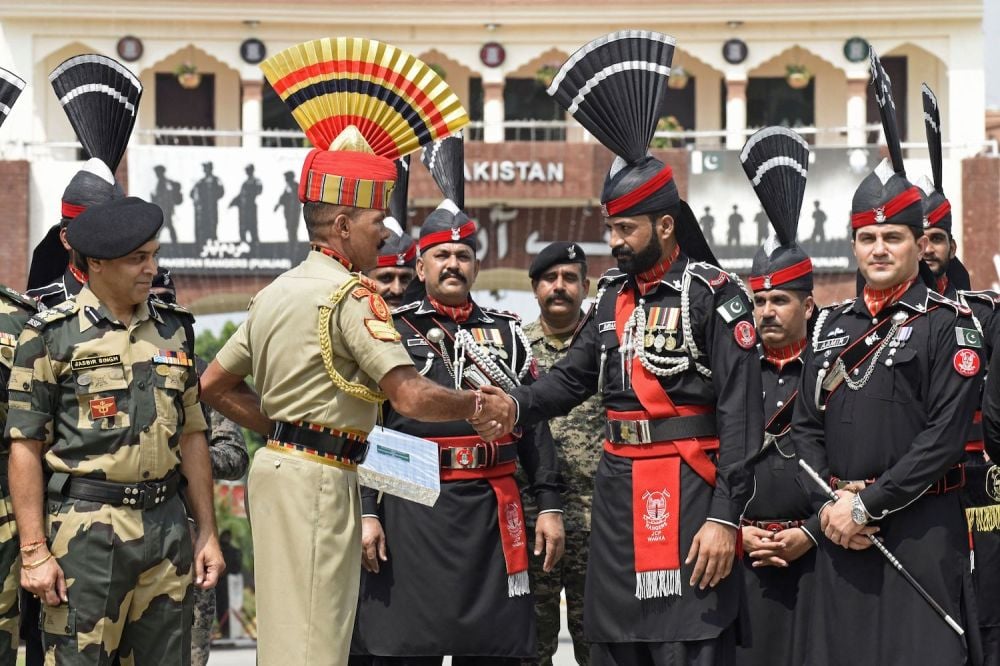Resuming trade with India is a chance to escape spiraling crises.

foreignpolicy.com
As Pakistan lurches from one crisis to another, it needs a fundamental rethink of its geopolitical and economic strategy. Without it, any International Monetary Fund program—the most recent being a “stand-by arrangement” for around $3 billion,
approved on July 12—only buys some time before the next cataclysm.
Pakistan must start putting sustainable and inclusive economic growth above all else, especially its elite-focused
policies that have created a cycle of profligacy and
austerity. Average annual economic growth between 2010 and 2022 has been lackluster, around 4 percent, and has been accompanied by a
rise in Pakistan’s total debt as a share of its GDP, from 55 percent to 76 percent. Bangladesh, in contrast, grew at an annual average of 6.2 percent over the same period, while its debt to GDP ratio
rose from 30 percent to 39 percent.
In addition to addressing spiraling debt, faster and more inclusive growth is the best pathway for the poor and vulnerable to join the middle class.
The big step Pakistan could take to reinvigorate growth would be to embrace trade with India, which is currently almost nonexistent. World Bank research, on which I worked,
reveals that Pakistan’s exports could increase by 80 percent, with commensurate impacts on GDP and employment, if it had a normal trading relationship with India. Extrapolating from these estimates, Pakistan’s exports of goods, only a mere $31.5 billion in 2022, could be about $25 billion higher if trade with India was realized. Another World Bank study
shows that India accounts for as much as 85 percent of Pakistan’s total unrealized trade potential.
Deeper economic engagement with India could also help address other acute problems in Pakistan’s economy, including rampant inflation, which has led to an
increase in poverty over the last year; a rent-seeking
private sector that constantly lobbies for protection and favorable tax treatment; and the long-standing
energy crisis, exacerbated by the ongoing economic calamity. Given the free fall of Pakistan’s economy since 2022, trade with India could prove very valuable.
Trade with India has been
virtually halted since 2019, following the Pulwama terrorist attack in India and the passage of the Jammu and Kashmir Reorganization Bill. Currently, Pakistan allows imports from India on an ad hoc basis. For trade to normalize in a way that allows Pakistan to reap its full benefits, Pakistan would need to first rescind the ban on imports from India, and India would need to remove the penal duty of 200 percent on Pakistani imports. These could be followed by Pakistan giving India “most-favored nation” status—the same tariff treatment as given to other trade partners—and India reinstating such status to Pakistan; both countries agreeing on a timeline for rationalizing tariffs; and Pakistan doing away with
trade restrictions on land borders.
The effects would be swift. Under normal trading arrangements, Pakistan’s imports from India, like its exports, would increase significantly. Had Pakistan allowed standard imports from India, they would have
helped alleviate back-breaking inflation affecting critical products such as wheat and onions (India is among the world’s top exporters), and mitigated the impact on the poor. Given the
sensitivity to inflation in South Asia, the political
benefits of inflation-reducing imports should not be underestimated.
Trade with India could also help increase competitive pressure and productivity in the domestic market. Moreover, the availability of an immense Indian export market could excite Pakistani entrepreneurs and introduce some added pressure on entrenched domestic industrialists. A larger market may also allow the incumbent players to be somewhat more generous in ceding space to potential competitors from Pakistan and India.
And then, on the energy front, India already exports power to Bangladesh and Nepal and has
significant surplus capacity. Its solar power
prices are amongst the lowest in the world. Given the easy geographical terrain, Pakistan can ameliorate its power crunch by importing power and refined petroleum from across the border in the Punjab, thereby fulfilling the promise of an
earlier dialogue that stalled for political reasons. It might even herald a very promising renewable energy
partnership.
In this way, a vibrant trading relationship with India can help Pakistan to realize significant
structural gains in an organic rather than mandated manner: by inducing productivity improvement and innovation, reducing price distortions, and enabling higher inflows of foreign direct investment. These are well-known gains from trade, but given the immense underexploited potential of bilateral trade, such gains are likely to be quite important for the Pakistani economy.
A key question is whether Pakistan’s military, which in effect wields veto power, would go along with this trade-centered approach. It might—for both tactical, short-term reasons, and for longer-term security benefits. During the
very hopeful 2011-2012 attempts to normalize trade between India and Pakistan, it was
vested economic interests (such as the agriculture, automobile, and pharmaceutical lobbies), rather than the army, that prevented the final steps from being taken. Now that Pakistan is suffering from unprecedented economic hardship, the army has
become a partner in an “
economic revival plan” that focuses on exports and foreign investment. Given the plan’s focus on dollar inflows and investment, the army may not be averse to reaping the benefits of engaging with the “enemy” economy.
In addition, the army might prefer to not have two active borders to deal with. Pakistan’s relations with Afghanistan have deteriorated over the past two years, and consequently, its defense forces are quite busy on its Western border as they deal with cross-border and local
attacks against the military and civilian population from the Taliban. In this situation, a quiet border with India—a
cease-fire between Pakistan and India has largely held since February 2021—is an attractive proposition. Cordial trade relations could help in meeting that goal.







